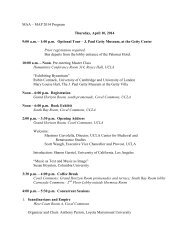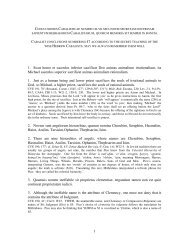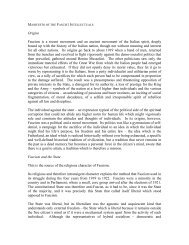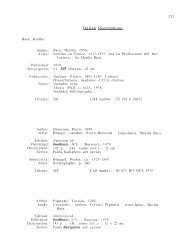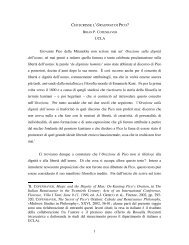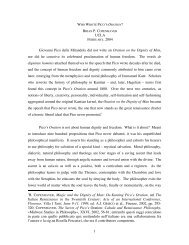1 (1) Pythagoras of Samos instructed the region of Italy once called ...
1 (1) Pythagoras of Samos instructed the region of Italy once called ...
1 (1) Pythagoras of Samos instructed the region of Italy once called ...
You also want an ePaper? Increase the reach of your titles
YUMPU automatically turns print PDFs into web optimized ePapers that Google loves.
(5) Should I mention o<strong>the</strong>rs? Theophrastus, Aristotle’s successor, usually disagrees with<br />
his teacher and is not shy about it, is he? 5 So much for <strong>the</strong> Greeks, not to mention that<br />
<strong>the</strong>y always admired Homer, Plato and Demos<strong>the</strong>nes more than Aristotle. What about<br />
<strong>the</strong> Latins? Did <strong>the</strong>y ever regard Aristotle as a sage? No, nor as <strong>the</strong> greatest philosopher<br />
ei<strong>the</strong>r. Was Varro an Aristotelian? Hardly, but he kept his path (if we want to believe<br />
Lactantius) straight between <strong>the</strong> two – Plato and Aristotle both. 6 Cicero was an<br />
Academic and a follower <strong>of</strong> Plato who always awarded Plato first place in philosophy, as<br />
almost everyone has done. 7<br />
Plancus was part Stoic, part Epicurean, but Brutus and Seneca were Stoics, <strong>the</strong> group that<br />
Jerome thinks most like <strong>the</strong> Christian religion. 8 Passing its teachings along as if he too<br />
were a Stoic, Ambrose followed Panaetius and Cicero. 9 The same pair lined up like<br />
colleagues with Hilary and Augustine, whose pr<strong>of</strong>essed view is that Plato is <strong>the</strong> prince <strong>of</strong><br />
philosophers. 10 Apuleius wanted to be a Platonist and to be known as one. Macrobius<br />
also pays much more deference to Plato, and this is no different than <strong>the</strong> view <strong>of</strong> Boethius<br />
– last <strong>of</strong> <strong>the</strong> scholars but, so it seems to me, more Platonist than Aristotelian even while<br />
he is completely Aristotelian. Somewhere he promised that he would show that <strong>the</strong>re is<br />
little distance between those authorities – following Porphyry, I suppose, who holds <strong>the</strong><br />
Platonic and Aristotelian sects to be <strong>the</strong> same, with Plato as master and Aristotle as<br />
pupil. 11<br />
5<br />
Theophrastus <strong>of</strong> Eresus (c. 372-c. 286 BCE) became head <strong>of</strong> Aristotle’s school in A<strong>the</strong>ns when his teacher<br />
had to leave town after Alexander died in 323. Theophrastus continued Aristotle’s work, but some<br />
authorities believe that he also criticized it by innovating in logic and o<strong>the</strong>r fields.<br />
6<br />
Marcus Terentius Varro (116-27 BCE), already legendary as a polymath in Cicero’s time, was more<br />
interested in erudition and literature than in philosophy, though his encyclopedic work On <strong>the</strong> Latin<br />
Language deals with philosophical problems <strong>of</strong> language. as much from a Stoic point <strong>of</strong> view as from any<br />
o<strong>the</strong>r. Lact. ???; Zippel’s citation seems wrong: De falsa relig. 1.6.<br />
7<br />
Marcus Tullius Cicero (106-43 BCE) was an eclectic in philosophy, having studied with Stoics and<br />
Epicureans as well as Academics. While Cicero revered Plato, he also honored Aristotle, and <strong>the</strong><br />
‘Academy’ that he knew had changed greatly since Plato’s day, having become <strong>the</strong> home <strong>of</strong> sceptics who<br />
attacked Stoics and Epicureans as dogmatists. While Valla was no doctrinaire Ciceronian on issues <strong>of</strong><br />
Latinity, he was powerfully affected by Cicero’s new celebrity, which had been advertised by Petrarch in<br />
<strong>the</strong> fourteenth century and <strong>the</strong>n later by numerous humanists, including Poggio Bracciolini, Valla’s<br />
nemesis. Although Cicero was well known in <strong>the</strong> Middle Ages, Petrarch and o<strong>the</strong>rs recovered some works<br />
that had fallen into oblivion, thus finding powerful new authority for cultural changes that <strong>the</strong>y wished to<br />
promote.<br />
8<br />
Hier. Comm. in Is. 4.11: Marcus Iunius Brutus led <strong>the</strong> conspiracy to assassinate Julius Caesar in 44 BCE.<br />
During <strong>the</strong> subsequent triumvirate, Lucius Munatius Plancus was consul in 42. Lucius Annaeus Seneca (c.<br />
4 BCE-65 CE) wrote important plays as well as prose works and letters, until Nero forced him to kill<br />
himself. Most <strong>of</strong> his prose, whose style and content greatly influenced <strong>the</strong> first Christians who wrote in<br />
Latin, deals with moral philosophy in <strong>the</strong> Stoic tradition; Brutus as Stoic ??? Plutarch ???<br />
9<br />
Although Ambrose (c. 333-97 CE) modeled a work On <strong>the</strong> Duties <strong>of</strong> Ministers on Cicero’s De <strong>of</strong>ficiis, he<br />
was also strongly influenced by Neoplatonism. Likewise eclectic was <strong>the</strong> Stoic Panaetius <strong>of</strong> Rhodes (185-<br />
09 BCE), whose treatise On Duty Cicero used for his famous work.<br />
10<br />
Both Hilary <strong>of</strong> Poitiers (d. c. 368 CE) and <strong>the</strong> great Augustine <strong>of</strong> Hippo (354-430) had studied <strong>the</strong><br />
Neoplatonists before converting to Christinity.<br />
11<br />
Apuleius <strong>of</strong> Madaurus (c. 125-c. 170) <strong>called</strong> himself a Platonist, wrote works on Socrates and Plato and<br />
was certainly a pagan. It is unclear, however, whe<strong>the</strong>r Ambrosius Theodosius Macrobius was a Christian.<br />
Born in <strong>the</strong> fourth century, Macrobius produced a Neoplatonic reading <strong>of</strong> Cicero in his Commentary on <strong>the</strong><br />
2<br />
2/21/05 9:35 PM 2/44



